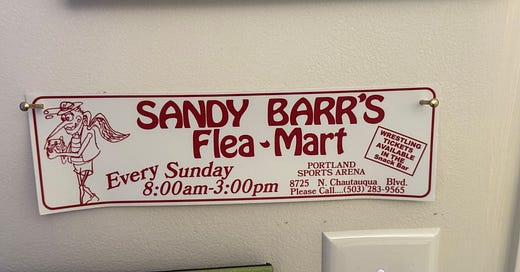The WWE is a corporate giant now, at the expense of Portland Wrestling, other territories
Those nights at the old Portland Sports Arena were special
World Wrestling Entertainment (WWE) made its debut on Netflix Monday with its Monday Night Raw show, which has been a dominating cable presence for many years. The 10-year deal with Netflix has been reported as being worth $5 billion to the publicly held company once owned and operated by Vince McMahon.
I have watched that wrestling company grow for many years, as it gobbled up local wrestling promotions rapidly under the leadership of McMahon, who is now completely out of the company due to its sale and his own bumbling issues with sexual harassment charges.
Like many of you who have grown up in Portland — or anywhere in Oregon and parts of Washington — I was a big fan of Portland Wrestling, the regional company operated primarily by Don Owen, who inherited the family business from his father, Herb.
As a kid starting out as a sports clerk answering phones at the Oregon Journal, I had an opportunity to get to know and eventually become friends with Owen, a man known for his stumbling ring introductions, but not appreciated for all the anonymous giving he did to local causes.
In those days, pro wrestling was a business centered on territories around the world, where aspiring wrestlers could hone their craft, learn how to do interviews (promos) and move up the ladder in the business. The best ended up in the biggest territories, where the money was usually the best.
The territories were governed mostly by an association of promoters — the National Wrestling Alliance and American Wrestling Association come to mind. There was also the World Wide Wrestling Federation, primarily New York and nearby states. There were many others, geographically based and many of them traded or shared talent.
Portland, for example, often shared talent with World-Class wrestling, the Von Erich promotion in Texas. Many territories sent promising youngsters to Calgary, to train in the famous dungeon — the basement of Stu Hart, the tough, old-school patriarch of a huge wrestling family.
In Portland, we saw a good portion of the best in the world, often in their younger days. We saw Roddy Piper, Jimmy Snuka, Jesse Ventura, the Iron Sheik, Buddy Rose, Dynamite Kid — and I’m missing more stars than I named. And of course, those appearances by NWA champ Ric Flair were always big.
But the reason for writing this today is that I was on hand in Portland when McMahon’s hostile takeover of nationwide territories began. Don Owen saw it coming. And he faced it with a sense of foreboding, a man who knew what his eventual fate would be.
Slowly, we started to see wrestling from Madison Square Garden appearing on Cable TV. A show once a month or more frequently, then weekly. Vince inherited that company from his father, too — with ambitious plans. He was ahead of the curve on the potential of cable TV.
He syndicated his product — and it was a good product, especially after he lured Hulk Hogan away from the AWA in Minneapolis — in many cities, buying local TV time on stations that usually carried the local product. It introduced his wrestling to people who didn’t have cable.
Soon, he had a juggernaut on his hands, stealing the very best wrestlers from all over the world with the big bucks he could now pay due to the massive exposure and the revenue it brought.
Don saw it all coming. He would throw in the towel in 1992.
“It’s New York,” he told me before I realized what was happening. “They are coming for us all. The kid (Vince) is not like his old man.”
I should say now I never heard Owen call it the WWF (which it was called in those days). In the manner of the day, it was called “New York,” just as World Class was called “Texas” or “Von Erich.”
I felt bad for Don, always known by the wrestlers as being a good “payout guy.” His product was for the people — affordable, fun and family friendly. He was proud of the wrestlers he had helped develop and left a legacy of doing good deeds behind the scenes. He lost the Portland Armory as the home for his shows and then bought an old bowling alley in the North end of town and converted it to his own venue that had everything he needed.
And paid it off about twice as fast as was contracted.
I’m going to spend some of this real estate over time on what it was like in those days at the Portland Sports Arena. There are stories from those days with Owen, Piper, Rose, The Grappler (the catcher on my adult baseball team) and others.
Look forward to those tales in the days to come. And you are going to need a subscription to read them.





A trip to the "Portland Spots Arena" on a Saturday night would guarantee that you would be coming home smelling like you were stuck in "Marlboro Country." Take your clothes off, put them in the garage and go get a shower" my mother would shout at us, as she would light up another Salem Cigarette.
I knew that, I just started reminiscing from my youth and all these old greats started spilling out. Super Fly became pretty famous, remember.... Shag Thomas? He had a mean head butt. Beauregard would hide that thumb to the throat and his less than stellar singing career.